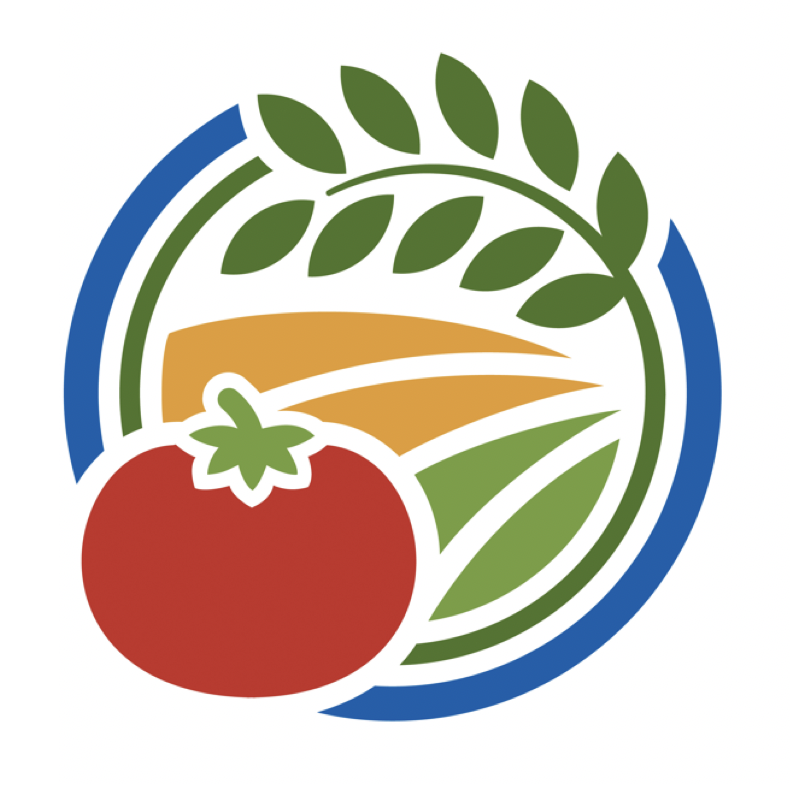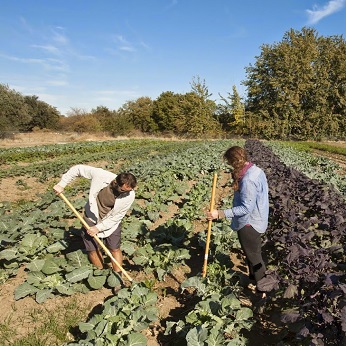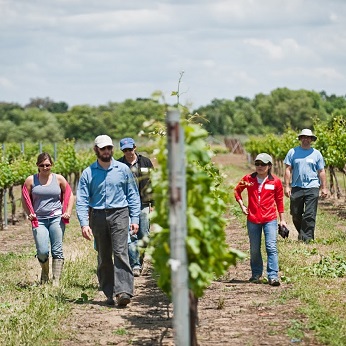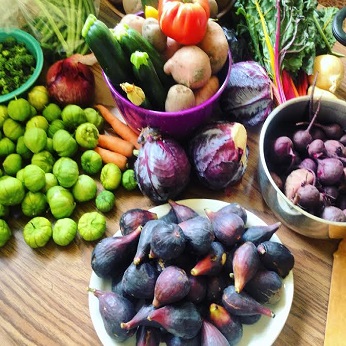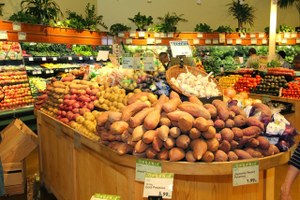
Institutional sustainable food procurement is the sourcing of sustainable products for residential and retail dining operations, concessions, vending, and catering. This generally requires a well-defined set of standards and definition for “sustainable food,” with variance across groups and organizations. Food procurement by institutions is important in sustainable agriculture and food systems because institutions can often purchase at a larger scale than can small retailers or other businesses. The choice of where to source larger quantities of agricultural products creates an opportunity for greater impact in promoting equitable incomes for food producers and food systems workers, ecological sustainability, and other values.
**Note: This page contains sustainability reports from various UC campuses. We are not always able to update information to reflect the most recent report. Please confirm current information on individual campus websites.
Overview
Large institutions - such as universities, colleges, hospitals, and other organizations with significant purchasing power - have the opportunity to support farmers and producers who operate with values of social, economic, and environmental sustainability, often at a greater scale than do smaller purchasers of farm products. To do so, institutional buyers often connect sustainable food producers with existing food distributors. Because small farms often can’t meet the demand of institutional-sized food service, institutional buyers will ask their distributors to aggregate farm produce from small farms to meet large-scale demand. Dining services also identify opportunities on dining menus to use a smaller amount of product bought directly from producers.
Benefits of establishing sustainable purchasing programs and relationships may include improved transparency between producers and their customers, leading to the ability to meet supply, quality, and cost expectations; support of farmers who pursue long-term soil health and other agroecological improvements, and promotion of businesses that provide equitable wages and safe working conditions.
Sustainable Purchasing Policies
In order to demonstrate the intention and decision-making processes in procurement, many institutions develop a sustainable purchasing policy. Policies can be used as a framework to drive purchasing decisions, create an incentive for change, address conflicts and barriers to success, and clarify the goals and expectations for suppliers, directors, and the general public. Defining sustainable food can be a contentious topic with a wide range of practices that may or may not be included. Although disagreements in definition may exist, these policies are generally an adaptable or revisable starting point for developing more sustainable food systems based on current and evolving research and economic or cultural constraints.
The University of California has created a UC Sustainable Practices Policy to guide sustainability efforts across all UC campuses. As of October 2017, the UC policy defines sustainable food as having at least one of the following attributes (criteria are in the process of being updated):
| Certified Humane Raised and Handled | USDA Organic | Locally Raised, Handled, and Distributed |
| Grass-finished/100% Grassfed | AGA Grassfed | Protected Harvest Certified |
| Marine Stewardship Council | Cage-Free | Global Animal Partnership (steps III, IV, V) |
| Domestic Fair Trade Certified | Locally Grown | Farm/business social responsibility policy includes union or prevailing wages, transportation and/or housing support, and health care benefits |
| Shade-Grown or Bird-Friendly Coffee | Food Alliance Certified | Farm/business is a cooperative or has profit-sharing with all employees |
| Rainforest Alliance Certified | Animal Welfare Approved | Seafood Watch Guide "Best Choices" or "Good Alternatives" |
| American Humane Certified | Fair Trade Certified | Other practices or certified processes brought to the Sustainable Foodservices Working Group for review |
The goal of the UC system is to achieve 20% sustainable food purchases by 2020. To achieve this, food service operations are expected to track and report annually the percentage of total annual food budget spent on sustainable food. Along with other recommendations for increasing sustainability, campuses are encouraged to form a foodservices sustainability working group to facilitate the campus goal and implementation process, and provide educational information to customers.
UC Contributions to Food Security Research and Action
In 2007 the UC Sustainability Steering Committee first approved the creation of a Food Systems Working Group to oversee development of policy guidelines for sustainable operations of campus dining facilities and procurement of sustainably produced food. In 2014 UC launched the Global Food Initiative (GFI) to work toward a world that can sustainably and nutritiously feed itself. This initiative explicitly involves documenting and promoting best practices in sustainable food sourcing. Each campus has been working towards this central goal with unique initiatives and projects.
UC Berkeley: In 2006 UC Berkeley became the first college campus eatery in the U.S. to offer a certified organic salad bar. In 2015-16 the amount of food purchased by Berkeley’s residential dining services that met one or more sustainable food criteria exceeded the UC 2020 policy goal of 205, though that was a 26%decrease from 2014-2015. In 2015 the campus published a review of on-campus restaurants and also received a Gold Medal from the the National Association of College and University Foodservice for its "Extreme Local" Dinner, showcasing menu items in which all ingredients came from within 250 miles. Brown’s cafe on campus also offers a seasonally dependent menu and sources almost all of its food locally. The Edible Education 101 course at UC Berkeley was created in conjunction with the Edible Schoolyard Project to bring food education to the university level. The course is a unique hybrid in that it is both a public lecture series and a for-credit class for students.
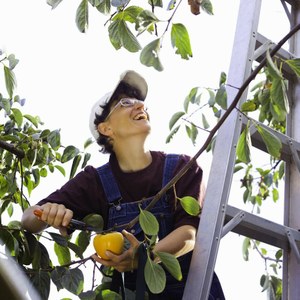
The Berkeley Food Institute created an interactive map of Berkeley’s food system to reveal barriers to full participation of historically marginalized community member in food-related learning and practice, and highlight opportunities and success in overcoming such obstacles.
UC Davis: In 2015-16 the amount of food purchased by Davis’ residential dining services that met one or more sustainable food criteria met the UC goal of 20%, though that was a 21% decrease from 2014. In the 2015 annual sustainability report dining services purchased 17% of its produce from local and sustainable sources, totaling 1.8 million dollars in sustainable food purchases. $61,000 was spent on campus grown products including 10,000 pounds of organic roma tomatoes and 10,000 pounds of whole wheat flour from the Russell Ranch Sustainable Agriculture Facility. Purchases from the UC Davis Student Farm Market Garden are also featured in all resident dining commons. Students working at the farm and chefs meet quarterly to plan for production for the upcoming growing seasons.
UC Irvine: In 2014-15 the amount of food purchased by Irvine’s residential dining services that met one or more sustainable food criteria reached 26%. Dining services defines local as within 250 miles of campus and offers details on the variety of the sustainable initiatives it is undertaking. The school is a participant in the Real Food Challenge. This is a national challenge to create and implement clear guidelines that prioritize community based, ecologically sound, fair, and humane food purchasing; waste reduction; and green dining facility standards. The effort aims to support the health of consumers, laborers, local economies, and the environment.
UCLA: In 2013-14 the amount of food purchased by UCLA’s residential dining services that met one or more sustainable food criteria reached 12%. Dining services offers an annual sustainability report with progresses and goals for the future.
UC Merced: In 2013-14 the amount of food purchased by Merced’s residential dining services that met one or more sustainable food criteria reached 13%.
UC Riverside: In 2014-15 the amount of food purchased by Riverside’s residential dining services that met one or more sustainable food criteria exceeded 20%. The campus offers an annual sustainability report with progress that has been made and future goals and initiatives. UCR’s 2010 Climate Action Plan calls for Dining Services to implement a comprehensive food procurement program that supports local and/or sustainable foods and to procure sustainable foods for 30% of total food purchases. Dining Services also buys oranges from the Campus Agricultural Operations to provide fresh-squeezed orange juice in the residential and retail restaurants.
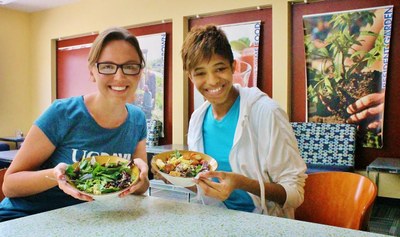
UC San Francisco: In FY 2015-16, the amount of food purchased by UCSF’s retail food services that met one or more sustainable food criteria increased significantly to 29%, thereby exceeding the 2020 policy goal. UCSF does not have any residential dining halls. Their philosophy is food service for a sustainable future, which means menu items with seasonal ingredients from local food growers. Bon Appétit was the first food service company to commit to supporting local agriculture with a defined purchasing target in 1999, reducing antibiotic use in farm animals and serving rBGH-free milk by 2003, and serving only cage-free eggs since 2005.
UC San Diego: In 2014-15 the amount of food purchased by San Diego’s residential dining services that met one or more sustainable food criteria reached 21%, with locally grown defined as within 250 miles from campus. Dining services also offers an annual sustainability report with progresses and goals for the future.
UC Santa Barbara: In 2014-15 the amount of food purchased by Santa Barbara’s residential dining services that met one or more sustainable food criteria reached 35%. 37% of produce purchases were grown within 150 miles of campus and 23% of produce was organic. UCSB has a goal of purchasing 55% sustainable produce by the end of 2017. Dining services also offers an annual sustainability report with progress and goals for the future.
UC Santa Cruz: In 2004 UCSC students first formed a Food Systems Working Group which drafted purchasing guidelines for the campus and pushed for an upheaval of the food services system away from corporate contracts with large scale food management companies. In 2012-13 the amount of food purchased by Santa Cruz’s residential dining services that met one or more sustainable food criteria reached 28%. In 2012 the campus signed The Real Food Campus Commitment, pledging UC Santa Cruz to purchase food that not only truly nourishes but also acknowledges producers, consumers, communities, and the earth. UCSC was one of the first colleges in California to sign this commitment, which states that 40% of all food purchases will be “real food” by 2020. The UCSC Food Map shows information on more than 20 of UCSC's suppliers, where they're located, and the types of food they grow, raise, and make.
Resources
Contributors: Leigh Archer, Bev Ransom, Mariah Coley
Reviewed by: Dani Lee, Samantha Lubow
How to cite this page
UC Sustainable Agriculture Research and Education Program. 2017. "Institutional Sustainable Food Procurement." What is Sustainable Agriculture? UC Division of Agriculture and Natural Resources. <https://sarep.ucdavis.edu/sustainable-ag/institutional-procurement>
